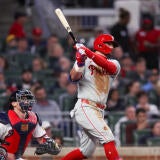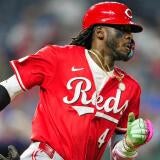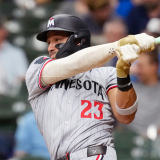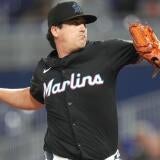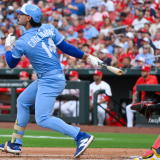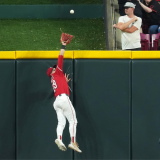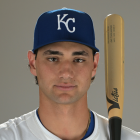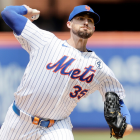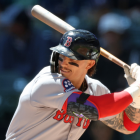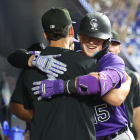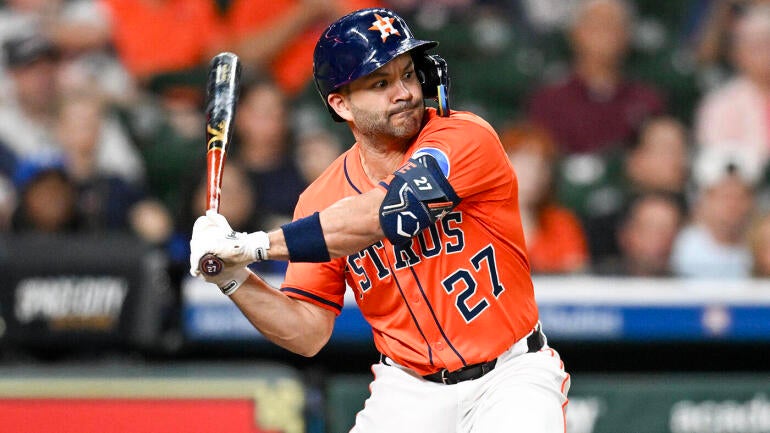
The Houston Astros lost to the Seattle Mariners on Friday night in the second game of a big weekend series between the top two teams in the American League West. The Astros, who won the series opener on Thursday, are now 3 ½ games back of Seattle. In other words, the Mariners will enter the new week in first place no matter what happens on the field the rest of this series.
It's fitting that these teams are competing on Memorial Day weekend, that time of the year when disciplined observers begin to pay attention to the standings. The season is roughly a third of the way complete, making it tougher to categorize sustained play (of the good or bad variety) as an illusion borne from small samples. That sense of authenticity extends to individual players, too, making for an interesting dynamic when it comes to a team like these Astros.
As noted above, the Astros are in the midst of yet another competitive season. In addition to possessing the second best record in the AL West (a good enough mark that they would qualify for the postseason if these things were decided in late May), they have the sixth highest run differential among AL teams, with a plus-21 margin. Look at the Astros' lineup on any given night, however, and you might be surprised by how many important veterans are underperforming.
On Friday, the heart of the Astros' order included left fielder Jose Altuve, catcher Yainer Diaz, and first baseman Christian Walker. In theory, that's a fine backbone of an offense. In practice, though, each of the three has an OPS at least 100 points inferior to their 2024 mark. Again, the season is far enough along that it's time to ask: Should the Astros be concerned?
Rather than just asking the question, I've attempted to answer it below with respect to those three notable Astros.
1. Jose Altuve, LF
It used to be an accepted rule of thumb within sabermetric circles that second basemen became crater risks once they entered their mid-30s. People don't believe that so much anymore, but it does make for a convenient setup to a joke about how the Astros must've moved Altuve to left field this spring after noticing he was nearing his 35th birthday -- that way, you know, the governing principles of the sport would spare him on a technicality. Unfortunately, it hasn't worked.
Jose Altuve had not hit a home run since April 28th.
— MLB (@MLB) May 23, 2025
He has TWO tonight! pic.twitter.com/b7xIu9JrdO
Altuve entered Saturday hitting .253/.303/.376 with six home runs and four stolen bases. His 92 OPS+ would represent the second-worst full-season mark of his career, ahead of only his showing in 2013. Given that he's now a most-days left fielder, and not a particularly effective one, it's fair to have some concerns about his overall contributions in what is the first year of his contract extension that runs through 2029.
Altuve has recorded multiple hits in three of his past four games, suggesting that he might be in the process of correcting course. Still, his performance this season contains a few pieces of worrying information. Most pertinently, he's hitting the ball at the extreme ends of the spectrum more often, resulting in a career-low percentage of batted balls between 10 and 30 degrees. The worst-case scenario here is that the preceding statistic captures a decline in his bat-to-ball skills -- not in how often he connects (he remains capable in that regard), but in his ability to find the barrel.
| Season | Air pull% | Ground pull% | Pop-up% | 10-30% |
|---|---|---|---|---|
2024 | 26.9% | 24.4% | 5.1% | 29.8% |
2025 | 19.4% | 31.9% | 12.5% | 19.4% |
Why does that matter? Because it threatens Altuve's capacity to be a well-above-average hitter. His barrel control has always helped him overcome lackluster exit velocities and bat speed. That trait has manifested both in his hitting line drives and in his pulling balls in the air and taking advantage of Houston's generous ballpark structure. It's notable, then, that Altuve is pulling fewer balls in the air and is instead hitting a career-high share of pulled ground balls.
Ultimately, it's to be seen if those statistics are indeed evidence of skill decay. Given Altuve's age, there surely has to be some decline at play. While his willingness to take up left field at this stage in his career speaks to his work ethic and selflessness, I do find myself concerned that this may be closer to his new normal than the impressive marks he produced over the last three seasons (143 OPS+). If so, it'll be interesting to watch if, when, and how manager Joe Espada moves Altuve around in the order.
2. Christian Walker, 1B
It was more than a little funny that the Astros, fresh off the José Abreu debacle that saw them bail in the second of a three-year agreement, decided the best way to upgrade at first base was … to sign another aging right-handed first baseman to a three-year pact. Walker, who was phenomenal over the last few seasons with the Diamondbacks, entered Saturday batting just .196/.263/.328. For those wondering, Walker's 67 OPS+ is worse even than Abreu's Houston career mark (73).
That scary note aside, Walker's underlying measures are significantly better than his topline results. His hard-hit percentage would represent his second best figure over the last five years, and he's actually hitting more balls within that 10 to 30 degree window than previously. His barrel rate, basically a combo of those metrics, is also in line with where it resided before last season.
What about Walker's increased strikeout rate, from 24.1% to 27.3%? Well, what about it? His contact rates (in zone and overall) are almost identical to last year. He is chasing more outside of the zone (and swinging more in general), but not to levels that alarm me. As weird as this may be to read, given his abysmal topline numbers, I'm not finding a ton of underlying reason for concern.
Even though I had my reservations about the Walker signing in the first place, I think that he's bound to get going sooner than later and separate himself from the Abreu comparisons.
3. Yainer Diaz, C
Diaz is, by far, the youngest player covered in this piece. He won't celebrate his 27th birthday until September, making it easier to envision him rebounding to his past heights (he had a 121 OPS+ over his first two seasons in the majors, as opposed to a 75 mark in 2025) on that fact alone. It's not just his youth, either. It seems clear to me that his season can be attributed to an approach change that hasn't clicked.
To these eyes, it appears that Diaz has been instructed (by the Astros or his own desires) to lift and pull the ball more frequently. That entails, among other things, meeting the ball further out in front of the plate. Perhaps the idea was to get his power levels back to 2023, when he homered 23 times and slugged .538. Alas, his ISO remains in line with his 2024 figure, all the while his batting average has collapsed. He's never been one to take a walk, leaving him in a bind offensively.
The interesting (and encouraging) aspect of Diaz's season is that a lot of his ball-tracking metrics are largely in line with how he's performed in the past. Take a look:
| Season | Exit velocity | 10-30 degrees% | Barrel% |
|---|---|---|---|
2023 | 90.3 mph | 32.4% | 22.3% |
2024 | 90.2 mph | 30.3% | 21% |
2025 | 90 mph | 29.4% | 17.6% |
There are some discrepancies, too. For example, Diaz's average exit velocity belies that he's hitting a fewer share of his balls over 95 mph. I'm not going to pretend everything has been fine and dandy. It's theoretically possible that he ends up having to revert to his old approach, that or suffer through more of a learning curve as he tries to make this one work for him. One way or the other, I do anticipate Diaz getting things sorted out and raising his level of play over the summer.
![[object Object] Logo](https://sportshub.cbsistatic.com/i/2020/04/22/e9ceb731-8b3f-4c60-98fe-090ab66a2997/screen-shot-2020-04-22-at-11-04-56-am.png)






